[vc_row][vc_column][vc_column_text]

Over 70 district Agricultural Extension Officers from 24 districts of Uganda underwent a one weeks training on Integrated Production and Pest and Disease Management courses (IPPM) at the Continuing Agricultural Education Centre (CAEC) at the Makerere University Agricultural Research Institute Kabanyolo (MUARIK).
Under the National Agricultural Policy (2016), the College of Agricultural and Environmental Sciences (CAES), Makerere University, is mandated among others to provide training for extension staff in Uganda.
This has been spelt out in a Memorandum of Understanding (MoU) between the Ministry of Agriculture, Animal Industry and Fisheries (MAAIF) and CAES. So far, a total of 2082 District Agricultural Officers have been trained by Makerere under this initiative.
The training that started on 19th – 24th August, 2019 was officially closed by Dr. Patience Rwamigisha, Commissioner Agriculture Extension and Skills Management at the MAAIF.
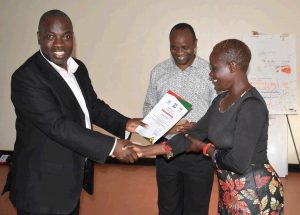
Dr. Rwamigisha congratulated the trainees upon completion saying, the Ministry has put in place a system and was looking forward to them to make it function efficiently to cause a transformation in line with the Ministry’s mission.
The commissioner noted that majority of Uganda’s households (about 80% ) are engaged in agriculture at different levels – business, semicommercial while 69% are in subsistence farming.
“So, you can see the task before us. When we look at research technologies and innovations generated, only 15% reaches the farmers at the grassroots. At farm level, optimum utilization of these technologies is only 28% and this is a problem we have to confront as MAAIF by doing extension right”, Dr. Rwamigisha said.
The commissioner explained that the aim of the Ministry was to first establish a functioning system and already, a strategy, structure, shared values, staff and management style have been put in place.
“We have put a code of conduct and standards of delivery accessible on the website. We looked at the technical content and we have a harmonized way of delivery. The latest material is on control and prevention of aflatoxins so that all NGOs working independently to develop materials are subjected to vetting to stop confusing farmers.
It is you people to let us succeed or let us down because you are the front line soldiers. If nothing is done everything will collapse”, The commissioner said.
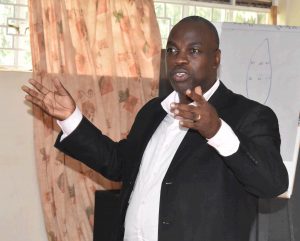
Dr. Rwamigisha disclosed that plans are underway to carry out an assessment of these trainings and the impact of extension services since the inception of the program two years ago.
He reported that the Ministry was committed to seeing extension services work on grounds that no transformation can occur without capacity building as an important component for the public extension services.
He also disclosed that Government has prioritized agriculture in the National Development Plan (3). “MAAIF has been tasked to write a paper on how to drive things. Government has invested a lot in infrastructure and they are saying, the infrastructure is lying idle. People to use it are in agriculture”.
Dr. Rwamigisa also said that the Director of the Agriculture Extension Services proposed the revitalization of the functions of the former district farm institutes.
Since most of these institutes were upgraded to Zonal Agricultural Research and Development centers, the Commissioner said, they are now working closely with NARO to establish training centers within the zonal research institutes.
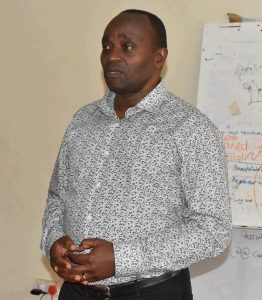
Speaking on behalf of the Principal CAES and the Vice Chancellor Makerere University, Prof. Archileo Kaaya welcomed and thanked the team from MAAIF and the trainees for attending the training session.
“We thank MAAIF for continuously working with Makerere University. The university’s role is to teach, research and do engagement with communities. So this training fits within our mandate and the Ministry has been very key in supporting us in this outreach role”, Prof. Kaaya said.
Kaaya commended the agricultural extension officers for supporting the agricultural industry noting with happiness that most of them including facilitators were products of Makerere University.
“My humble request is that you put in practice what you have learnt. Farmers have got a lot of challenges and they need your extension services. Read farther and add on what you have learnt, so that you are different from the farmer.” Prof. Kaaya advised.
On behalf of the university, Kaaya thanked the facilitators for coordinating the program and the World Bank and other partners for sponsoring the initiative.
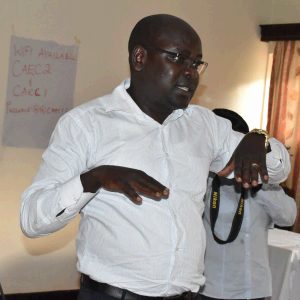
Makerere University Program Coordinator, Dr. Bernard Obaa said the training dubbed, “Agricultural Integrated Production and Pest Management” is part of the project called Agricultural Cluster Development Project (ACDP) funded by the World Bank.
“The training focused on five key crops namely, beans, coffee, rice, maize and Cassava and three core areas in each crop was tackled firstly with the climate smart agronomic practices by establishing how these crops are grown taking into account the current climate change by establishing the most appropriate practices”, Dr. Obaa said.
The second component he said focused on integrated pest and disease management for each of the crop and how they can be managed appropriately in addition to the post-harvest handling right from harvesting to consumption while reducing contamination and issues of aflatoxins.
Dr. Obaa said the training also addressed other cross cutting issues ranging from management of soils holistically, cost benefit analysis in order to guide people on profitable enterprises and ethics in farming as a business in relation to the currently fake inputs in the market.
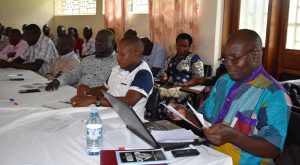
For example, spraying vegetable with chemicals has got farming effects on contamination and this has to be addressed ethically.
He said the training was aimed at building capacities of other extension workers to be able to train farmers’ groups to address the gaps in farming as a business.
He said although the extension workers are graduates, their capacity needs to be strengthened to enable them train farmer show to handle their crops and to fighting against pests and diseases.
He said a total of 2082 extension workers in various districts have been trained in different areas of agriculture under the CAES-MAAIF partnership.Of these 1000 extension workers were funded under the World Bank for a period of two years with the rest being funded under IFAD.
Report compiled by;
Jane Anyango,
Principal Communication Officer, CAES[/vc_column_text][/vc_column][/vc_row][vc_row][vc_column][famous_grid_gallery][famous_grid_gallery_playlist_item img=”9920″ data_description=”Some of the trainees”][/famous_grid_gallery_playlist_item][famous_grid_gallery_playlist_item img=”9935″ data_description=”Commissioner Dr. Patience Rwamigisha and Prof. Kaaya handover the certificate of attendance to one of the participants”][/famous_grid_gallery_playlist_item][famous_grid_gallery_playlist_item img=”9936″ data_description=”A section of participants during the training”][/famous_grid_gallery_playlist_item][/famous_grid_gallery][/vc_column][/vc_row]
